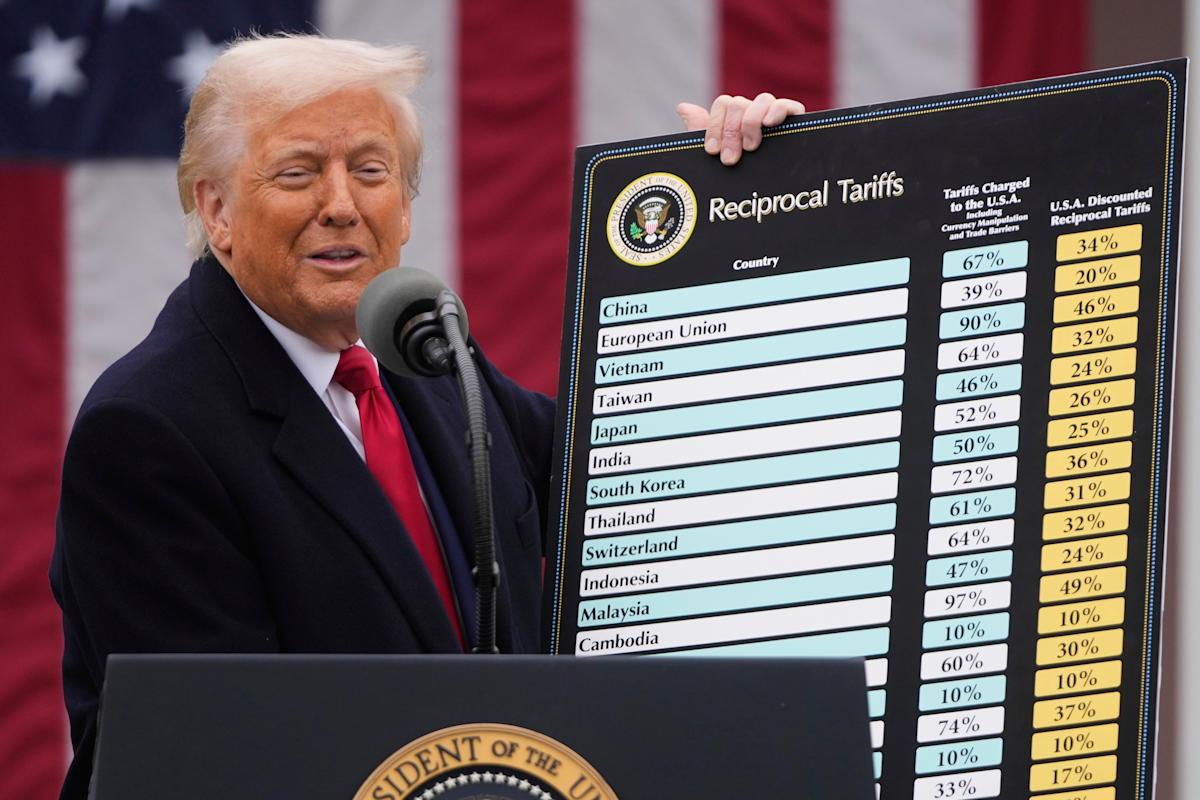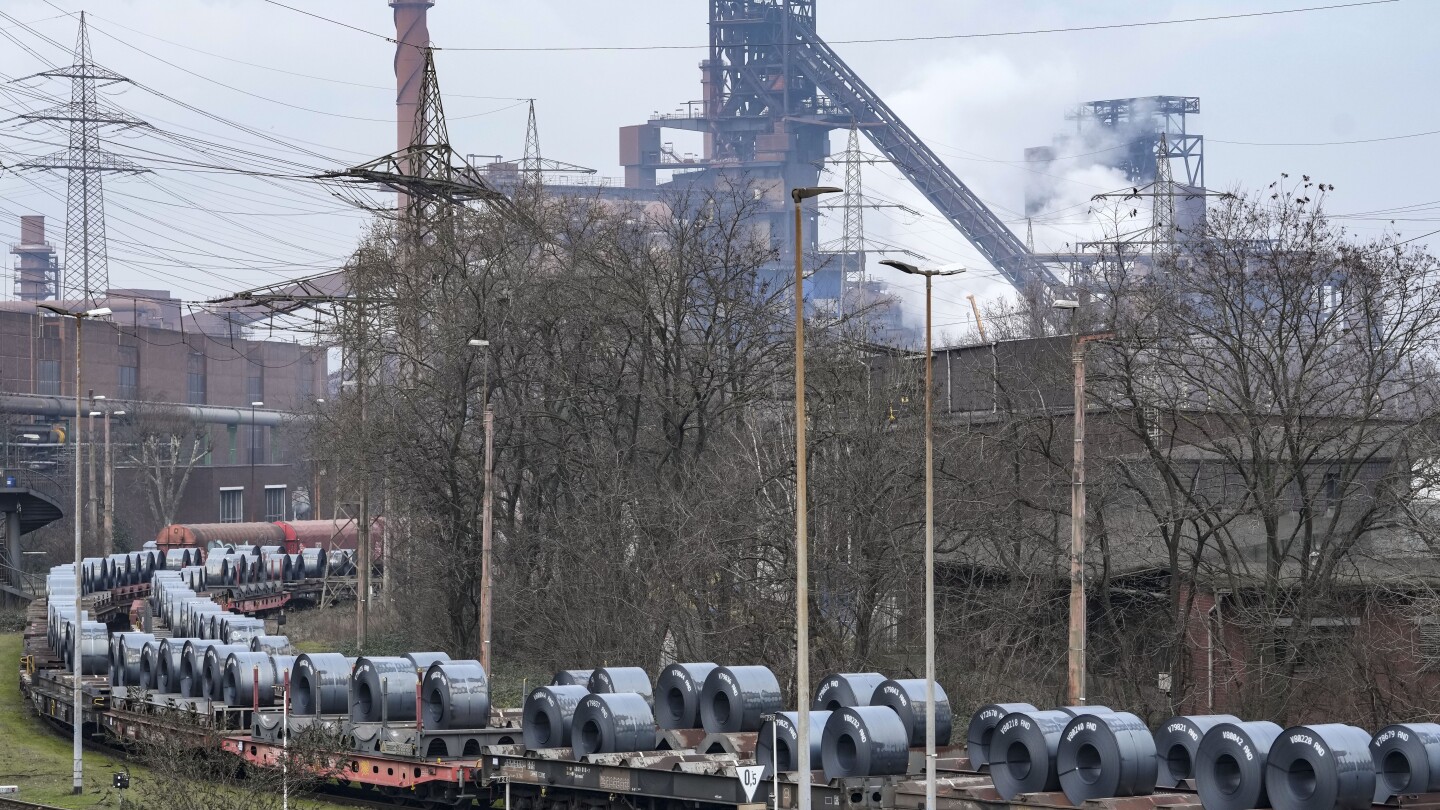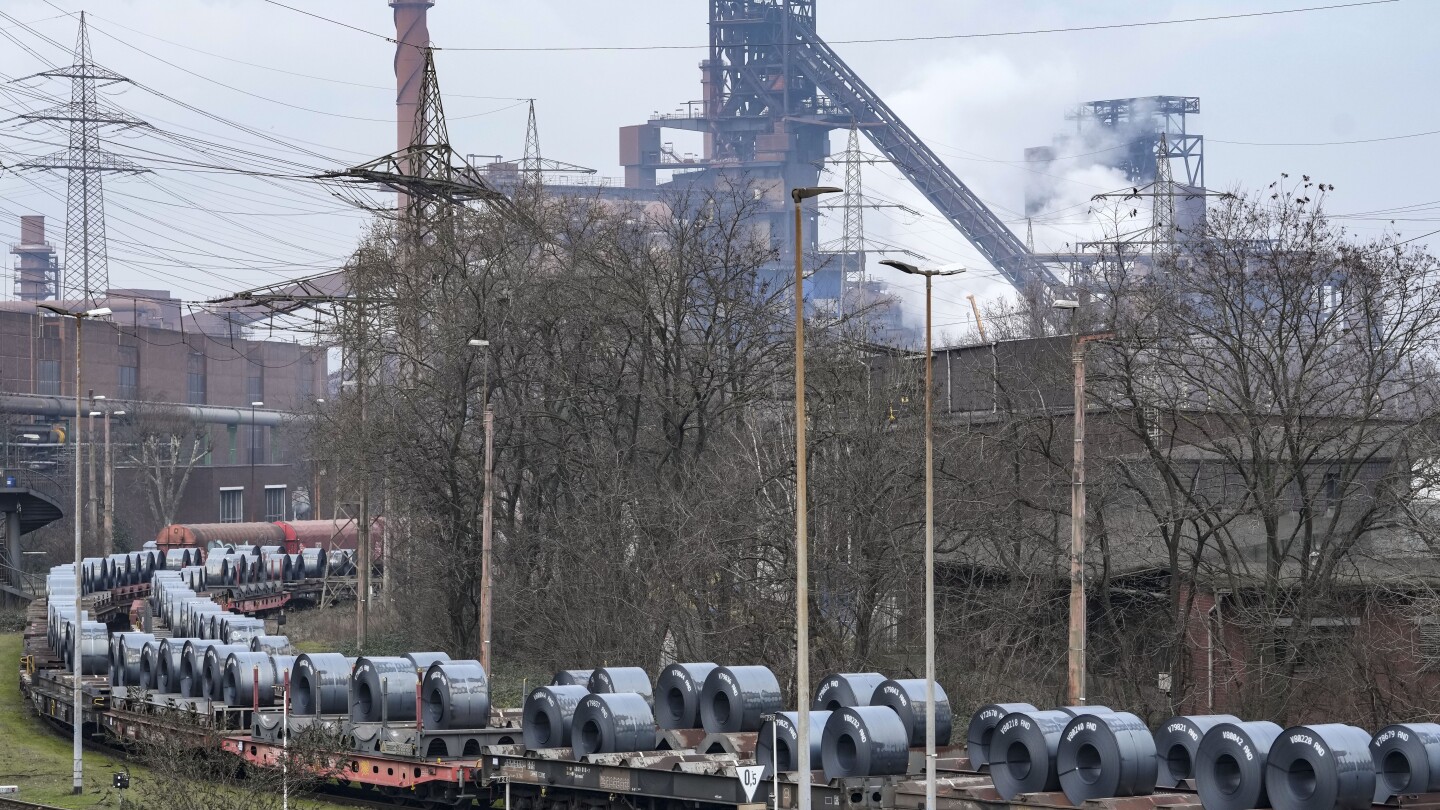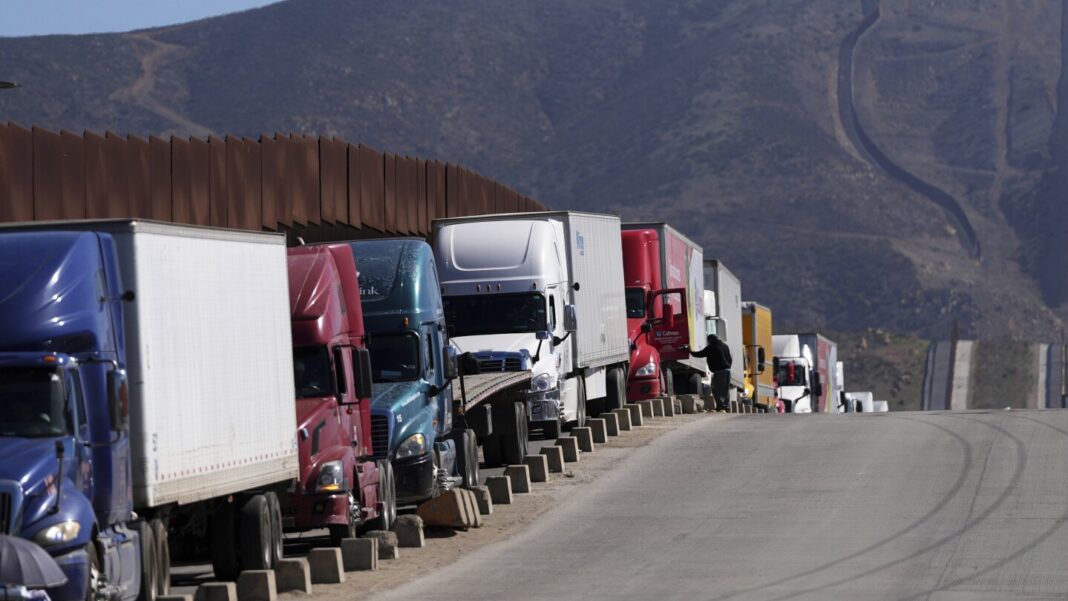The air is thick with apprehension as the United States throws down the gauntlet, imposing “reciprocal” tariffs on dozens of nations. This bold move, shrouded in the language of economic fairness, has sent ripples of concern across the globe. Are these tariffs a necessary defense against unfair trade practices, or will they spark a trade war that could plunge the global economy into turmoil? Join us as we analyze the ramifications of this controversial policy and explore the guarded reactions it’s eliciting from countries on every continent.
Tariff Frenzy: US Trade War Erupts

The trade war between the US and its major trading partners has escalated, with President Donald Trump imposing reciprocal tariffs on Mexico, Canada, and China. This move has sparked a chain reaction of retaliatory measures from affected nations, leaving global markets reeling.
US Trade War: A Global Reaction
Countries Affected: A Regional Breakdown

The tariffs imposed by the US have far-reaching implications for several countries. Mexico, Canada, and China were the initial targets, with the European Union (EU) also retaliating with tariffs on American goods.
Mexico and Canada, two of the US’s largest trading partners, have been affected significantly. Mexico has imposed tariffs on $3 billion worth of American goods, including whiskey, pork, and cheese. Canada has retaliated with tariffs on $12.6 billion worth of American goods, including steel, aluminum, and agricultural products.
The EU has also joined the fray, imposing tariffs on $3.2 billion worth of American goods, including bourbon, motorcycles, and peanut butter. This move is seen as a targeted response to the US tariffs on steel and aluminum imports.

Business Implications: Companies Feeling the Heat
The tariffs have significant implications for businesses on both sides of the border. Semiconductor stocks have plunged in after-hours trading, with companies like Apple, Nvidia, and TSMC investing heavily in their US operations to avoid tariffs.
Spirits producers have also been affected, with the EU tariffs on American whiskey disrupting exports to the region. The Distilled Spirits Council has expressed disappointment at the move, citing the negative impact on US spirits exports to the EU.
The EU’s targeted tariffs on American goods have also raised concerns about the impact on American businesses. The American Chamber of Commerce to the EU has urged both sides to negotiate a comprehensive trade agreement to avoid further escalation.
The US Perspective: Trump’s Trade Strategy
Tariffs as a Trade War Tool: A Shift in US Policy

President Trump’s decision to impose tariffs on several countries marks a significant shift in US trade policy. The move is seen as an attempt to reduce trade deficits and create jobs, but critics argue that it will backfire and hurt American consumers and businesses.
Trump has cited the trade deficits with Mexico and Canada as a reason for the tariffs, claiming that the US has been taken advantage of in trade agreements. He has also linked the tariffs to the opioid crisis, accusing Canada and Mexico of allowing fentanyl to enter the US.
The Technology Angle: Big Tech’s Response to Tariffs
The technology industry has been at the forefront of the trade war, with several companies investing heavily in their US operations to avoid tariffs. Apple has pledged to invest $500 billion in its US operations over the next four years, creating 20,000 new jobs.
Nvidia, TSMC, and OpenAI have also invested in their US operations, with Nvidia pledging to invest hundreds of billions of dollars in the US supply chain. SoftBank’s Stargate AI venture has also promised to create over 100,000 American jobs almost immediately.
These investments are seen as a response to the tariffs, with companies attempting to mitigate the impact of the trade war on their operations. However, critics argue that the tariffs will ultimately harm American consumers and businesses.
Global Market Implications: Tariffs and Inflation
The trade war has significant implications for global markets, with the tariffs leading to a rise in inflation and uncertainty for businesses. The tariffs have already led to a decline in stock markets, with concerns about the impact on economic growth.
The EU’s retaliatory tariffs on American goods have added to the uncertainty, with concerns about the impact on transatlantic trade relations. The trade war has also raised concerns about the impact on global supply chains, with companies scrambling to adjust to the new tariffs.
As the trade war continues to escalate, one thing is clear: the implications for global markets and businesses will be significant. Only time will tell if the tariffs will achieve their intended goal of reducing trade deficits and creating jobs, or if they will ultimately harm American consumers and businesses.
Financial Markets in Flux: Tariffs Spark Market Volatility
US Stocks Plunge Amid Trade War Uncertainty
The Dow Jones Industrial Average plummeted by over 500 points, while the S&P 500 index fell by 2.3% as investors reacted to the tariffs imposed by the US on Mexico, Canada, and China. The uncertainty surrounding the trade war is causing anxiety among investors, leading to a volatile market that is likely to continue in the coming days.
EU’s Tariffs on American Goods: A Blow to European Markets
The European Union has imposed tariffs on American goods, including beef, poultry, bourbon, and motorcycles, in response to the US tariffs on steel and aluminum. This move is expected to have a significant impact on European markets, particularly in the automotive and agricultural sectors.
Commodities Market Shift: Tariffs Impact on Global Trade
The tariffs are also expected to have a significant impact on the commodities market, particularly on agricultural commodities such as soybeans and corn. The price of these commodities is likely to rise as a result of the tariffs, which could lead to increased costs for consumers and food manufacturers.
Inflation Looms: Tariffs and Prices on the Rise
Consumers Feel the Pinch: Higher Prices on Imported Goods
Consumers are likely to feel the impact of the tariffs as prices on imported goods rise. This could lead to a decrease in consumer spending, which could have a negative impact on the overall economy.
Business Costs Rise: Tariffs Weigh on Companies’ Bottom Lines
Companies that import goods from countries subject to tariffs will need to absorb the increased costs or pass them on to consumers. This could lead to decreased profits and potentially even losses for some companies, particularly those in industries with thin margins.
Diplomatic Fallout: US Trade Partners React
Canadian Response: Trudeau Calls Out Trump’s Tariffs
Canadian Prime Minister Justin Trudeau has reacted strongly to the tariffs imposed by the US, calling them a “betrayal” and a “mistake”. He has also announced that Canada will impose its own tariffs on American goods in response.
EU’s Diplomatic Efforts: Seeking a Trade Deal
The European Union has announced that it is willing to negotiate a trade deal with the US, but only if the US agrees to roll back its tariffs. The EU has also imposed its own tariffs on American goods in response to the US tariffs on steel and aluminum.
The Way Forward: Will Tariffs Succeed in Creating Jobs?
US Trade Policy: A Shift in Strategy?
The tariffs are part of a shift in US trade policy aimed at protecting American industries and creating jobs. However, it remains to be seen whether this strategy will be successful in achieving its goals.
Global Trade: A Complex Web of Relationships
Global trade is a complex web of relationships, with many countries relying on each other for goods and services. The tariffs imposed by the US are likely to have a ripple effect on global trade, potentially leading to a trade war that could have far-reaching consequences.
Conclusion
As the United States imposes ‘reciprocal’ tariffs on dozens of nations, the international community is reacting with a mix of caution and concern. According to the AP News, the tariffs, which are aimed at leveling the playing field, have sparked widespread criticism from trade partners and allies alike. The move has also raised concerns about the potential impact on global trade, economic stability, and even the threat of retaliation from affected countries.
The significance of this move cannot be overstated, as it has the potential to disrupt the delicate balance of global trade and undermine the principles of fair and free trade. The implications are far-reaching, with some experts warning of a global trade war that could have devastating consequences for economies worldwide. Moreover, the tariffs have also raised questions about the intentions and tactics of the US administration, sparking debate about the role of protectionism in economic policy.
As the situation continues to unfold, one thing is clear: the global economy is at a crossroads. The imposition of ‘reciprocal’ tariffs has opened a Pandora’s box, and the consequences of this decision will be felt for years to come. As nations grapple with the fallout, one question remains: will the pursuit of protectionism ultimately lead to a safer and more stable economy, or will it sow the seeds of chaos and uncertainty? The answer, much like the future of global trade, remains uncertain.
